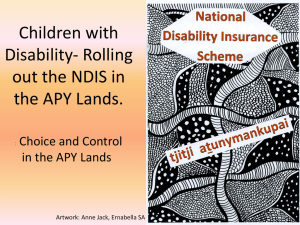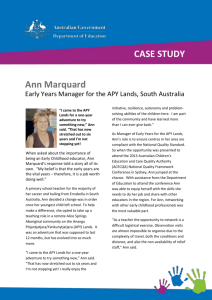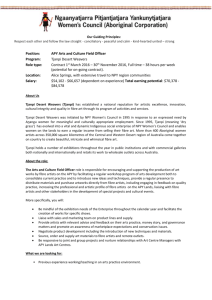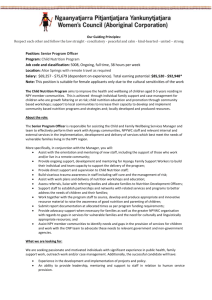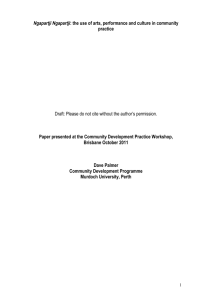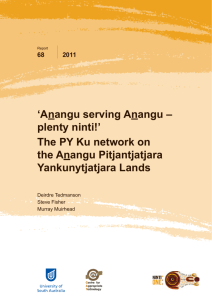Mr Richard King, Anangu Pitjantjatjara Yankunytjatjara
advertisement
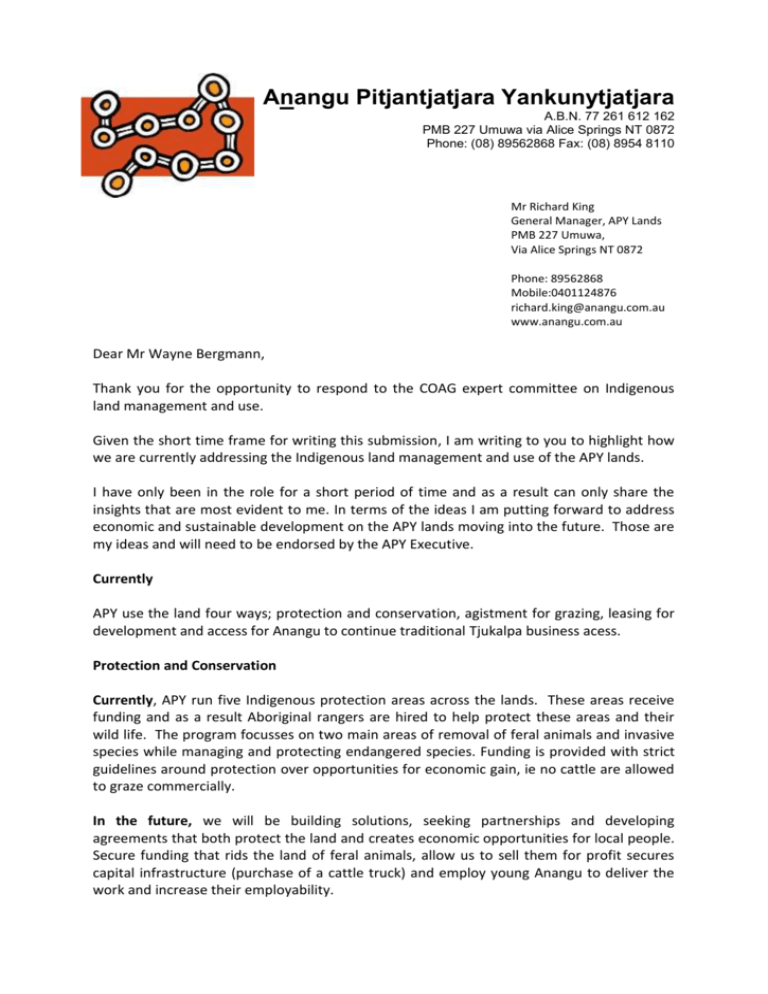
Anangu Pitjantjatjara Yankunytjatjara A.B.N. 77 261 612 162 PMB 227 Umuwa via Alice Springs NT 0872 Phone: (08) 89562868 Fax: (08) 8954 8110 Mr Richard King General Manager, APY Lands PMB 227 Umuwa, Via Alice Springs NT 0872 Phone: 89562868 Mobile:0401124876 richard.king@anangu.com.au www.anangu.com.au Dear Mr Wayne Bergmann, Thank you for the opportunity to respond to the COAG expert committee on Indigenous land management and use. Given the short time frame for writing this submission, I am writing to you to highlight how we are currently addressing the Indigenous land management and use of the APY lands. I have only been in the role for a short period of time and as a result can only share the insights that are most evident to me. In terms of the ideas I am putting forward to address economic and sustainable development on the APY lands moving into the future. Those are my ideas and will need to be endorsed by the APY Executive. Currently APY use the land four ways; protection and conservation, agistment for grazing, leasing for development and access for Anangu to continue traditional Tjukalpa business acess. Protection and Conservation Currently, APY run five Indigenous protection areas across the lands. These areas receive funding and as a result Aboriginal rangers are hired to help protect these areas and their wild life. The program focusses on two main areas of removal of feral animals and invasive species while managing and protecting endangered species. Funding is provided with strict guidelines around protection over opportunities for economic gain, ie no cattle are allowed to graze commercially. In the future, we will be building solutions, seeking partnerships and developing agreements that both protect the land and creates economic opportunities for local people. Secure funding that rids the land of feral animals, allow us to sell them for profit secures capital infrastructure (purchase of a cattle truck) and employ young Anangu to deliver the work and increase their employability. What this means for APY, We can capture to deliver Camels (75000) and Donkeys (25,000) to market. The profits will enable APY to fix paddocks and bores. Recruit Anangu to do the work and eventually restock with drought tolerant cattle that begin to reduce the fuel loads of introduced buffle grass which is chocking out native species and creating a huge fire risk to local flora and fauna. Agistment for Grazing Currently, third party agistment for grazing brings in a modest amount of untied funds. However, development of the paddocks are general carried out by the agisters who in term take their investment off of the agistment costs payable to APY. These costs can be over priced with little evidence to show the actual costs of their infrastructure costs. While this is one way to bring funding into the APY there is little local involvement and local skills developments as agisters tend to employ their own stock handlers. In the future, APY will have their own stock handlers and workers. All infrastructure will be done by APY and costed into the agistment costs to the agister. As paddocks come on line with water and fencing they will be stocked with funds generated by the third party agisters. This enables APY to manage the expenditure for paddock upgrades and reduce debt from over inflated estimation from third party paddock developers. All the lands and paddocks being developed will have heritage assessments completed to ensure that all TO’s are identified and involved in decision making from the outset. Development of paddocks will be determined on the TO’s agreement to have a portion of their payment set aside to develop their paddocks. What this means for APY and TO’s, It means that we will have jobs for the Anangu in the future and that TO’s will have more control of the resources coming out of their lands. APY will have funds to maintain a maintenance crew of boundary riders whom, are Anangu and come from the Traditional areas that they are managing. This will enable Anangu to have a business that they are very much a part of while still maintaining a very important connection to country and traditional Tjukalpa sites. As more of these paddocks come on line and more funds become available APY can start to reduce their reliance on third party agisters and run their cattle on their own lands while managing the natural resources. Additionally, there are opportunities for side line business to spring up that could be run by the APY in the first instance and eventually by individual Anangu in the longer term. Truck and transport, buying and sell of cattle. Transporting cattle or weaners from drought areas fattening them before sending them to market. Tourism, is another industry that could be setup considering how close APY is to Ularu. The great cattle drive culminating in a Tjukalpa festival could be done to give a real cultural experience to the traveller who thought they have done it all. The cattle drives could be used to both train young people in the industry and move cattle between paddocks while tourist pay APY for the experience making the training cost neutral. We could also use these session as a good opportunity for cultural exchange and teaching people about desert survival and desert conservation. Anangu in Prison, Currently there are 60 to 70 Anangu in prison, about quarter are in prison for offences that could be served on community services if they were monitored well. DCS SA, have programs that build the capacity of Anangu in areas that could be very useful to the APY. Training men to work in the cattle industry while they are incarcerated is one such opportunity. Training those whom have the ability to read and write in trades that can be utilised on the lands in another. Even training people to read and write is important and can serve as a spring board to other specialist areas. Focusing on tickets that help in the development of a viable work force will all contribute to taking a problem and turning it into a solution. Leasing for development Currently, all leasing is setup to ensure access to the land does not disturb sites of significance. There is not much leasing done to draw money into the APY other then what is done around heritage clearances and the initial negotiations. Very little money flows to APY or TO’s from long term lease and other business opportunities on the lands. In the future, APY will need to run the leasing of land under the APY land rights ACT as a business opportunity to build wealth for Anangu. All leasing should be conditional on joint partnerships with established Anangu business. The fees generated from such venture could be put back into training the next generation of Anangu entrepreneur in the form of supporting training co-delivering specialised training or development and implementation of rural college or university scholarships. What this means for APY and TO’s, It means that Anangu capacity is built over time and that there will be a pool of educated business people making use of their traditional lands with the help of APY in the initial stages with a plan to have TAFE and education partners take over in the longer term. APY can use the lease to tap a percentage of all business activities on the lands the enable to delivery, maintenance and implementation of capital infrastructure that supports the business and facilitates future growth and investment from Anangu and partner in the lands for the TO’s and the next generation. Anangu Traditional Tjukalpa Access Currently, Anangu enjoy their lands in relative solitude. they are free to travel and engage in Ingma when and where they are required too. Some of their time is done working while some is done observing their culture. This is a way of living that is about choices. This won’t change in the foreseeable future although the next generation may be more driven to acquire possessions it is not the main priority that get people to work every day. In the future, APY will have to build this life style into the way we run our business and stage our major events. There are certain times of the year when everything slows down and business is the main focus. We will respond by planning our year and managing our businesses around these times also. Work hours and leave will be flexible enough to enable a skeleton team to keep things moving while other a free to engage in their cultural obligations. Employment conditions will need to flexible enough to ensure that one job can be shared between two people so that they can determine when they want to work and when they want engage in community activities. All staff engaged in such an arrangement will only be paid for the hours that they work. What this means for APY and Traditional Owner’s, It means that Anangu can have the best of both worlds. Well-structured systems will see business grow and feed on itself to create wealth and distribute that wealth back into the community through the TO’s and family structures. It will means that Anangu are free to be what they are without feeling they have to conform to mainstream. They will use their lands and the time to generate wealth through TO’s structure or generate wealth individually by both engage in work and leisure. There are many ideas that I could share but they are my ideas. The trick is to impart those ideas so that they become Anangu ideas that grow into action with my support. The ideals that underpin my thinking are simple. I have always believed that Aboriginal people are the solution and not just the problem. I believe in the principles of Social Justice and Social Inclusion within a framework of Social, Economic and Environmental sustainability. These are the principles that have guided my life and are reflected in every position I have held, as my CV can attest. While I am here as the General Manager I will execute my role and use every opportunity build the capacity of others so that they can reach their fullest potential. The ability for Anangu to develop their own businesses and generate their own employment must be built into the flexibility of any land use agreement. Anangu cannot be free to access their land and at the same time be a slave to parameters set down in the land use agreement. We must all be aware of protecting the rights of people, but allowing people enough freedom to secure their own financial independence through the fruits of their labour. These are the thoughts of Richard King, Interim General Manager, APY Lands
